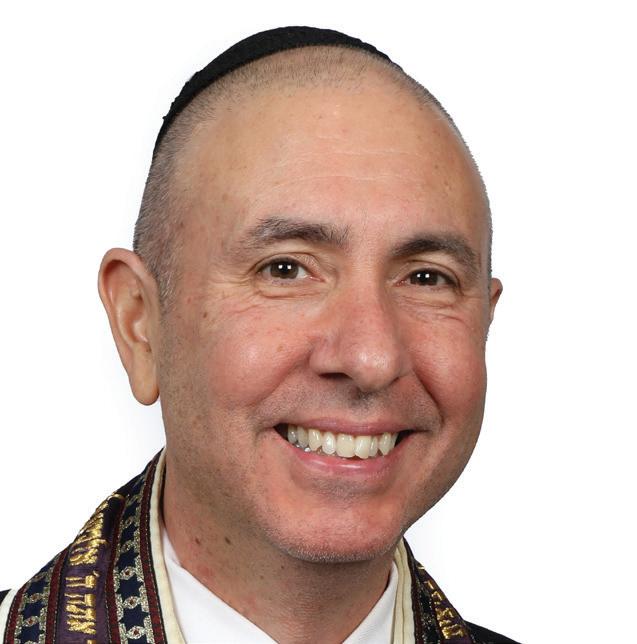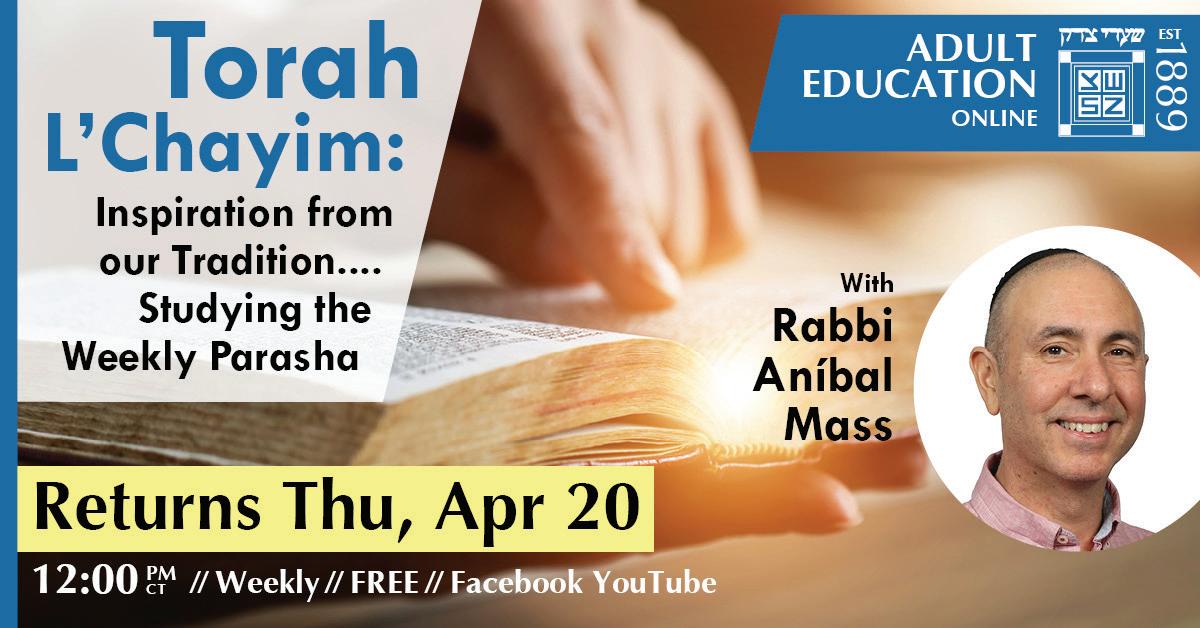
3 minute read
Pesach Doesn't Exist — Change My Mind A Message From Rabbi Anibal Mass, Spiritual Leader
I know, you may be wondering what I mean when I say that Pesach doesn’t exist. I don’t blame you! There is actually a great deal of confusion about what we are truly celebrating on the night of the Seder and during the entire week of Passover.
If you look through the Haggadah and the Siddur (prayer book), Passover is referred to as Chag haMatzot haze, Z’man Cheruteinu (this Feast of Unleavened Bread, the Time of our Freedom) and not as Chag HaPeasach (Feast of the Paschal Lamb).
So, the first thing we need to understand is that the Hebrew name of the holiday, Chag haPesach, is not necessarily entirely related to the fact that the angel of death passed over the houses of the Israelites during the tenth plague. Pesach is the name of the lamb that the Torah mandates to be ritually slaughtered on the evening of Passover and eaten on the first night of the holiday with Maror (bitter herbs) and Matzah.
During the times of the Temple, that lamb was placed on the table at the Passover Seder and was eaten by the guests gathered together, along with other food. As a mark of respect for the memory of the temple sacrifices, the eating of lamb on Passover is not part of the Ashkenazi tradition. Interestingly, it is traditional among Sephardic people, however, not roasted.
Since the Paschal Lamb doesn’t exist anymore, the Feast of the Paschal Lamb, Chag haPesach, actually doesn’t exist anymore!
What many people have forgotten over time is that Passover is in fact an overlap of at least two significant biblical events: the Feast of the Paschal Lamb (Chag haPesach), and the Feast of Unleavened Bread (Chag HaMatzot).
Chag haMatzot is a completely separate festival. We read in Leviticus 23:5-6, “in the first month (Nissan), on the fourteenth day of the month at dusk, is Pesach unto the Lord. And on the fifteenth day of the same month is Chag haMatzot unto the Lord; seven days you shall eat matzot.”
A closer examination of these verses reveals that there are, in fact, two different festivals on the 15th of Nissan. The first is Chag haPesach, which begins at around midday on the 14th day of Nissan and continues until midnight, the 15th of Nissan. On the eve of the 15th of Nissan, a different festival begins concurrently and lasts for seven whole days. This festival is called Chag haMatzot.
According to the Torah, we are commanded to eat matzah (unleavened bread) for a week, and, at the same time to avoid chametz (leavened bread). We could therefore argue that the avoidance of chametz is the real essence of the holiday, especially when one considers the extent to which it occupies our thoughts and energy in the days leading up to Passover. Based on this, even though it’s called Chag haMatzot, the obligation of eating Matzah is only for the nights of the Seder. After that, even though the festival is called Chag haMatzot, the only obligation is the avoidance of Chametz, and we don’t have to eat Matzah if we choose not to.
In Judaism chametz is the symbol of the evil inclination, and of sin. As we read in the Talmud: “Rabbi Alexandri, when he finished praying, would add the following: Sovereign of the Universe, it is known full well to You that our will is to do Your will. What prevents us from doing so? The yeast in the dough…” (T.B. Brachot 17a)
Perhaps now we can understand why there is a necessary overlap between Chag haPesach and Chag haMatzot. Chag haPesach, while not celebrated trough the traditional lamb anymore, remains our connection to the Exodus, to the moment we became free from Pharaoh. Chag haMatzot is connecting us to the fact that it’s not just about freedom, but a responsible freedom, without the evil inclination that pushes us to transgress and to disrespect such precious freedom.

And, yes, the biblical Chag haPesach doesn’t technically exist anymore, but the message of a responsible freedom ever present at the Seder and during Chag haMatzot, should resonate in our lives the whole year.
Ashira and I wish all of you a joyous celebration – may it be meaningful and may we all feel the blessing of freedom.
Chag Sameach,










